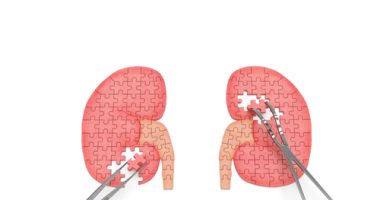Experimental Treatments for Alport Syndrome
Bardoxolone Methyl
Bardoxolone methyl (RTA 402) is an investigational oral therapy to treat the symptoms of chronic kidney disease (CKD) that occurs as a result of Alport syndrome. Bardoxolone methyl is a small molecule that reduces oxidative stress and inflammation, which may improve kidney function in Alport syndrome patients.
Ezetimibe
Ezetimibe is a type of cholesterol-lowering medicine that is being investigated as a therapy for Alport syndrome. Scientists intend to assess the safety and efficacy of the compound in a mouse model before it can be considered for use in human clinical trials.
RG-012
RG-012 is currently being investigated in a Phase 2 clinical trial. The treatment aims to inhibit the action of a small molecule called microRNA-21, which is believed to repress various protective processes in the kidneys.
Statins
Statins are a group of therapies that inhibit an enzyme called HMG-CoA reductase. This enzyme is involved in one of the key steps in synthesizing cholesterol in the body. By blocking this enzyme, cholesterol levels in the blood are reduced.
TX200
TX200 is an investigational therapy being developed to prevent an immune-mediated rejection of a kidney transplant. TX200 is a chimeric antigen receptor (CAR) T-cell therapy that uses a subset of the patient’s regulatory T-cells, which are part of the immune system.
Gene Therapy
Gene therapy may be a treatment option for Alport syndrome, as the disease is caused by a mutation in one of three genes: COL4A3, COL4A4, or COL4A5. Gene therapy could allow the body to produce the missing type 4 collagen protein, addressing symptoms that affect the kidneys, eyes, and ears.
Stem Cell Therapy
Stem cell therapy approaches for Alport syndrome are aimed at replacing specialized kidney cells called podocytes, which surround the capillary blood vessels in the kidneys and are an essential component of the kidney’s filtration system. It involves transplanting stem cells from a healthy donor, whose collagen-type 4-encoding genes are intact, into patients.






